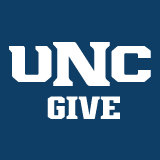Two funds — the Bear Pantry Fund and the UNC Disaster Relief Fund — have received gifts from generous donors who wanted to help UNC students dealing with some of the economic impacts of COVID-19.
The Bear Pantry is specifically focused on addressing the issue of food insecurity on campus, while the Disaster Relief Fund provides critical support to students as they work to overcome the financial, social and emotional burdens resulting from the COVID-19 pandemic, ensuring they can continue to pursue their education at UNC.
Last year, before the economic impacts of the pandemic, a national survey estimated that as many as half of all college students experience food insecurity as they struggle to support themselves while working, attending classes, and dealing with other life issues. The COVID-19 pandemic has intensified the severity of food insecurity on college campuses and for many UNC students.
UNC’s Bear Pantry assists those students by providing access to a stocked food pantry, as well as to on-campus dining through the Bear Share Meal Swipe program, which allows other students to donate extra meals to fellow Bears.
The pantry has received gifts from the university community and generous alumni and friends, along with grants from the Weld Recovers: COVID-19 Fund from Weld Community Foundation, United Way of Weld County ($10,000), and the Colorado Blueprint to End Hunger ($6,500). These gifts and grants have enabled the pantry to respond to the urgent needs of students throughout the COVID-19 pandemic.
How Bear Pantry Helped Me
Perspective by Danielle Ananea ’20, Anthropology
UNC’s Bear Pantry helps to address food insecurity for many students and their families, including Danielle Ananea and her daughter, Tirion.
The Bear Pantry at UNC has had a tremendous impact on my life. I come from a background of food insecurity and am a first-generation college student. So, navigating campus resources was a necessity for not only my success, but for my survival. Additionally, I have a daughter who is now in the 4th grade who has benefited from the Bear Pantry as well.
When I was in elementary school during the summer break there was a free lunch program for all of the children in Post Falls, Idaho who were under the age of 18. It gave me the support to stay safe away from home and also nourished me while I was growing.
When I started at UNC, I was a transfer student from a community college that didn’t have the resource of the food pantry on campus. At UNC, a faculty member made an announcement about it, but I felt uncomfortable going at that time, since I wasn’t sure how or when to use it. Then I was in a meeting that included Deana Davies, assistant director of student outreach and support with the dean of students office.
Deana and I discussed the Bear Pantry and she walked me to Michener Library (Bear Pantry has since moved to the University Center) and showed me how to start the process. Because of my childhood experiences, I felt compelled to begin a research project for one of my classes surrounding the Bear Pantry.
I completed an ethnography and found out that the majority of students at UNC do, in fact, have food insecurities that would be supplemented if they were aware of what being food insecure meant. After completing my data collection, I started an informal club where I asked students from the Humanities and Social Sciences if they wanted to walk with me over to the Bear Pantry on Tuesdays in the afternoon; we had days where up to 10 students would come along!
The Bear Pantry not only provides food and some toiletries, but also a sense of belonging that a lot of students need when they leave home. The volunteers and staff that run the Bear Pantry have become close friends of mine and have greatly decreased the amount of stress, anxiety, depression and other psychological issues perpetuated by being hungry.
My daughter loves the Bear Pantry, too! At the beginning of the pandemic, the Bear pantry was supplying students with premade bags, and mine happened to have a roll of toilet paper in it! I’ve never been so grateful for flushable paper.
It’s been hard for me to figure out how to put how I feel about the pantry into words. During my time at UNC, I experienced domestic violence that caused a brain injury, a car accident that caused a spinal injury that required surgery during the semester, and the finalization of my divorce during my degree. Because of all the turmoil and lack of family support, my daughter and I experienced homelessness off and on throughout my education, but we never went without food. So, while I was busy trying to figure out where and how we would have somewhere to live, I knew that my daughter would never suffer an empty belly, because I have the Bear Pantry on our side!



